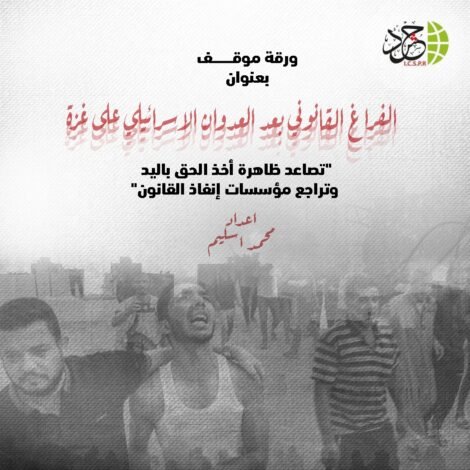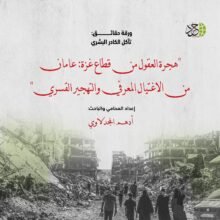
ICSPR issues a new position paper on the legal vacuum following the Israeli aggression on Gaza, warning of the rise in “taking the law into one’s own hands” and the decline of law enforcement institutions
Date: October 27, 2025
Press Release
ICSPR issues a new position paper on the legal vacuum following the Israeli aggression on Gaza, warning of the rise in “taking the law into one’s own hands” and the decline of law enforcement institutions
The International Commission to Support Palestinians’ Rights (ICSPR) issued a new position paper titled: “The Legal Vacuum Following the Israeli Aggression on Gaza: The Rise of Taking the Law into One’s Own Hands and the Decline of Law Enforcement Institutions,” prepared by researcher Mohammed Asleem. The paper discusses the manifestations of institutional and judicial collapse in the Gaza Strip following the latest Israeli aggression and the resulting disintegration of law enforcement agencies and the official judicial and security systems, which led to increasing chaos, insecurity, and a growing phenomenon of “taking the law into one’s own hands” amid the absence of legal deterrence.
Issued in 2025, the paper sheds light on the most serious transformations that followed the aggression, foremost among them the collapse of the judicial and security infrastructure, the decline of public confidence in the law, the rise in crime rates and individual and family disputes, as well as the spread of local armed groups and the monopolization of goods and humanitarian aid—all amid the absence of state authority and the erosion of institutional legitimacy.
ICSPR emphasized in the paper’s summary that the systematic Israeli aggression on Gaza since October 2023 has led to the erosion of justice institutions and the paralysis of law enforcement agencies after targeting more than 240 police stations, 10 judicial complexes, and 8 public prosecution offices, in addition to the killing and loss of hundreds of judicial and legal personnel. This resulted in an almost complete paralysis of the justice system and the suspension of thousands of civil and criminal cases, producing a severe legal vacuum that has extended to all aspects of public life.
The paper noted that the institutional collapse after the aggression was not limited to the destruction of facilities but also included the disintegration of executive authority in the field due to the displacement of about 70% of security personnel and the loss of communication across most areas of the Strip. This led to the spread of personal weapons and the emergence of local armed groups operating outside the law.
The Commission documented a significant rise in crime rates, recording a 45% increase in individual and family assaults, more than 200 theft cases, 45 local armed clashes, and 35 individual or family murders in the first few months following the ceasefire.
The paper explained that this situation directly affected the social fabric and citizens’ trust in the law. The widespread institutional collapse pushed many individuals to seek self-help solutions to conflicts, leading to a rise in the phenomenon of taking the law into one’s own hands, which reflects the loss of formal justice and the sense of lacking legal protection.
The paper devoted special attention to this phenomenon, describing it as one of the most dangerous social and security consequences of the aggression, as the enforcement of justice shifted from state institutions to individual and collective actions outside the law.
ICSPR documented 62 incidents of taking the law into one’s own hands, including 27 cases of family revenge, 15 cases of collective assault, and 20 cases of tribal punishment without legal basis, indicating that vigilante justice has become a field substitute for judicial authority.
According to the paper, this phenomenon reflects the erosion of trust in justice institutions and the breakdown of legal deterrence, revealing a dangerous transformation in the relationship between the citizen and the state. The Commission also noted the growing calls on social media to incite “personal retribution,” and the activities of local armed groups taking on “community security” roles or controlling aid distribution—resulting in widespread violations of individual and collective rights.
ICSPR stressed that this phenomenon represents a serious breach of the rule of law and equality before it, as well as a flagrant violation of the right to a fair trial, calling for an urgent official response to restore the authority of the law and prevent the escalation of vigilante justice that threatens public order and civil peace.
The paper highlighted that the decline of law enforcement institutions in Gaza after the aggression is among the most dangerous forms of institutional collapse, exposing the fragility of the legal system and its limited resilience in times of crisis.
According to ICSPR reports, over 750 police officers and 100 judicial and prosecutorial staff were killed, while around 45% of criminal complaints submitted between November 2023 and April 2024 were suspended without any official action—deepening the justice crisis and widening the gap between the state and society.
The Commission emphasized that the authorities in the Gaza Strip bear a dual legal responsibility:
First, to ensure the minimum level of public security and law enforcement despite exceptional circumstances; and second, to uphold the state’s duty to protect the right to life and personal security in accordance with international human rights law and the two international covenants.
The paper called for the gradual reactivation of public prosecution offices, the reopening of courts in safe areas, the training of justice personnel on crisis management, and the publication of transparent and periodic reports on the performance of judicial bodies to rebuild public trust.
It further linked institutional weakness to the worsening of crime rates, noting a 220% increase in the use of personal weapons and a rise in the activities of local gangs and monopolies amid the absence of oversight.
ICSPR commended the role of civil society organizations in temporarily bridging the institutional gap through monitoring legal violations, providing legal aid to victims, launching community reconciliation initiatives, and conducting awareness campaigns to promote the culture of legality.
The Commission also stressed the need for the international community to assume its responsibilities in supporting the rebuilding of justice institutions by providing financial and technical assistance to rehabilitate damaged judicial and security facilities, pressuring the Israeli authorities to stop targeting justice infrastructure, and supporting transitional justice, accountability, and anti-impunity programs.
The paper concluded by emphasizing that the legal vacuum left by the Israeli aggression on Gaza extends beyond the material or institutional dimensions, reaching deep into the moral and social fabric that defines the relationship between citizens and the state.
ICSPR warned that the continuation of this vacuum without urgent intervention will entrench chaos and civil violence, calling on official authorities to adopt a comprehensive national plan to rebuild the justice system and the rule of law, as essential pillars for protecting rights and ensuring societal peace after the ongoing humanitarian catastrophe.





